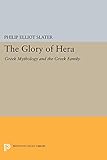The Glory of Hera : Greek Mythology and the Greek Family / Philip Elliot Slater.
Material type: TextSeries: Mythos: The Princeton/Bollingen Series in World Mythology ; 606Publisher: Princeton, NJ : Princeton University Press, [2014]Copyright date: ©1992Edition: Course BookDescription: 1 online resource (544 p.)Content type:
TextSeries: Mythos: The Princeton/Bollingen Series in World Mythology ; 606Publisher: Princeton, NJ : Princeton University Press, [2014]Copyright date: ©1992Edition: Course BookDescription: 1 online resource (544 p.)Content type: - 9780691605654
- 9781400862818
- 306.8/0938 20
- online - DeGruyter
- Issued also in print.
| Item type | Current library | Call number | URL | Status | Notes | Barcode | |
|---|---|---|---|---|---|---|---|
 eBook
eBook
|
Biblioteca "Angelicum" Pont. Univ. S.Tommaso d'Aquino Nuvola online | online - DeGruyter (Browse shelf(Opens below)) | Online access | Not for loan (Accesso limitato) | Accesso per gli utenti autorizzati / Access for authorized users | (dgr)9781400862818 |
Frontmatter -- CONTENTS -- PREFACE -- ACKNOWLEDGMENTS -- Part One: ORIGINS AND CONSEQUENCES -- CHAPTER I. The Greek Mother-Son Relationship: Origins and Consequences -- CHAPTER II. Symbols, the Serpent, and the Oral-Narcissistic Dilemma -- Part Two: MYTHICAL DEFENSES AGAINST THE MATERNAL THREAT -- CHAPTER III. Sexual Dominance: Zeus -- CHAPTER IV. Masculine Antisepsis: Apollo -- CHAPTER V. Matricide: Orestes -- CHAPTER VI. Self-Emasculation: Hephaestus -- CHAPTER VII. Identification with the Aggressor: Dionysus -- CHAPTER VIII. Identification with the Aggressor: Dionysus -- CHAPTER IX. Identification with the Aggressor: Dionysus -- CHAPTER X. Identification with the Aggressor: Dionysus -- CHAPTER XI. Maternal De-Sexualization: Perseus -- CHAPTER XII. The Multiple Defenses of Heracles -- Part Three: QUANTIFICATIONS, GENERALIZATIONS, AND IMPLICATIONS -- CHAPTER XIII. Familial Emphases in Greek Myth: A Statistical Analysis -- CHAPTER XIVI. A Cross-Cultural Analysis of Maternal Ambivalence and Narcissism -- CHAPTER XV. Cultural Pathology and Cultural Development -- APPENDIXES -- BIBLIOGRAPHY -- INDEX -- Backmatter
restricted access online access with authorization star
http://purl.org/coar/access_right/c_16ec
The ancient Athenians were "quarrelsome as friends, treacherous as neighbors, brutal as masters, faithless as servants, shallow as lovers--all of which was in part redeemed by their intelligence and creativity." Thus writes Philip Slater in this classic work on narcissism and family relationships in fifth-century Athenian society. Exploring a rich corpus of Greek mythology and drama, he argues that the personalities and social behavior of the gods were neurotic, and that their neurotic conditions must have mirrored the family life of the people who perpetuated their myths. The author traces the issue of narcissism to mother-son relationships, focusing primarily on the literary representation of Hera and the male gods and showing how it related to devalued women raising boys in an ambitious society dominated by men. "The role of homosexuality in society, fatherless families, working mothers, women's status, and violence, male pride, and male bonding--all these find their place in Slater's analysis, so honestly and carefully addressed that we see our own societal dilemmas reflected in archaic mythic narratives all the more clearly."--Richard P. Martin, Princeton UniversityOriginally published in 1992.The Princeton Legacy Library uses the latest print-on-demand technology to again make available previously out-of-print books from the distinguished backlist of Princeton University Press. These editions preserve the original texts of these important books while presenting them in durable paperback and hardcover editions. The goal of the Princeton Legacy Library is to vastly increase access to the rich scholarly heritage found in the thousands of books published by Princeton University Press since its founding in 1905.
Issued also in print.
Mode of access: Internet via World Wide Web.
In English.
Description based on online resource; title from PDF title page (publisher's Web site, viewed 30. Aug 2021)


